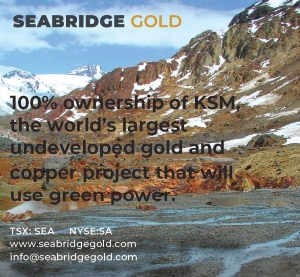Mining and the Law: Governor picks knowledgeable expert to lead DEC
Last updated 1/28/2007 at Noon
While the jury may still be out when it comes to our new governor, Sarah Palin, it sure seems like she is starting off on the right foot.
Every administration must wrestle with the need to recruit high-quality leaders to head up the state's many agencies and departments.
First, the best and the brightest must be persuaded to put down their present vocations, usually at a substantial pay cut, to pursue a new direction; next, they are confronted with the dilemma of whether to relocate to Juneau with the attendant life disruptions, or commute as the demands of state require; and finally they must be prepared to bear the scrutiny of the mobs that couldn't or wouldn't venture into public service themselves but have the "constitutional right" to sling mud at those who do.
Gov. Palin has asked Larry Hartig to be her commissioner of Environmental Conservation, and I, for one, loudly applaud her choice. I asked Larry a series of questions designed to highlight his record and introduce him to the populace, and here, in his own words, is his reply:
JPT: - Larry - Tell us a little bit about your background and experience with environmental regulation.
LH: - I have been an attorney in Anchorage in private practice for the last 23 years, primarily assisting mining, oil and gas, and other resource companies in complying with environmental laws. This work has included helping clients secure permits from the Environmental Protection Agency, DEC, the Corps of Engineers and other agencies for natural resource projects. Prior to that, I worked mostly on land title issues. I worked in the land legal department at Alyeska Pipeline Service Co. (for a contractor), assisting with right-of-way work during construction of the Trans-Alaska Pipeline System. From there, I went to work for several title companies.
JPT: - What is your educational background?
LH: - I have a law degree from Lewis & Clark Law School in Portland.
JPT: - How did you happen to get involved with representing mining operations?
LH: - I joined Hartig Rhodes Hoge & Lekisch after law school in 1983. The firm was doing a substantial amount of oil and gas and mining related work. Because of my strong interest in natural resource development and environmental law, I soon began working with the firm's natural resource clients. Over the years I continued to become more and more focused on natural resource and environmental law matters.
JPT: - Do you think that mining can be consistent with the need to protect the environment?
LH: - I believe, like a majority of Alaskans, that responsible resource development is critical to the state. Alaskans are also acutely aware of the risks to the land and water of the state if development is not done right. The public must have confidence in the companies who operate in Alaska and the state agencies who regulate them. It is important we all work together to build this public trust.
JPT: - As a newly appointed regulator, what experiences can you bring to the job that will make the Department of Environmental Conservation more effective in carrying out its mission?
LH: - I hope that my 23 years experience as an environmental attorney in Alaska working with EPA, DEC and other agencies for a variety of clients has given me a good understanding of the environmental programs administered by DEC and the science behind these programs. I also trust that I have gained insight into the practical concerns regulated parties are faced with as they strive to meet all of their environmental obligations. Through my involvement in the permitting of projects around the state I have become familiar with local concerns, such as subsistence hunting and fishing, commercial fishing, and the need for a good public process to try to avoid or minimize future conflicts.
JPT: - Do you have any thoughts with regard to the state taking over the lead from EPA concerning the issuance of National Pollutant Discharge Elimination System permits?
LH: - There are a number of potential advantages to the State of Alaska having primacy. These include having permit writers who better understand the Alaska environment, are more accessible to the permittees and public, and who can be more responsive to permitting needs. There are also challenges to taking over NPDES permitting. These include training or finding enough qualified permitting people to meet the needs of the program. Another challenge will be adequately funding the program while maintaining reasonable permit fees.
JPT: - Mines are listed as a primary source of pollution because of the inclusion of mine waste on the toxic release inventory; do you have any thoughts as to the appropriateness of this listing or whether it should be changed somehow?
LH: - I can certainly appreciate the public's interest in knowing the types and quantities of wastes that are being generated and managed in the state. It is important the information conveyed to the public be factually correct. There is certainly the risk the terms "toxic release inventory," when applied to low-toxicity, well-managed waste, could mistakenly imply there has been an actual release to the environment with dire consequences.
JPT: - Do you have any substantial experience with the environmental problems of other major Alaskan industries such as oil and gas, logging or fishing?
LH: - I have spent more time in my practice representing mining companies than other types of resource client, but I have worked with major oil and gas companies, independents and oil service companies in Alaska on a variety of matters.
In regards to logging, I have served on the state Board of Forestry for over 12 years.
This board oversees and annually reports to the governor and Legislature on the state's Forest Resource Practices Act.
The act governs harvest activity in riparian areas.
I was involved, through the Board of Forestry, in the development of the current FRPA regulations.
I have also represented Native corporations with mineral, timber and fish plant operations.
I have found these different industries share many of the same environmental issues and requirements.













Reader Comments(0)